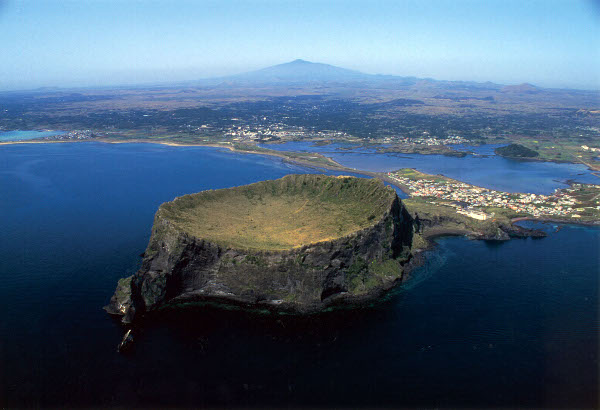| |
 |
|
| ▲ Mt. Hallasan and Seongsan Ilchulbong. Photo courtest Seogwipo City Hall |
This article is part of a promotional series ahead of the 2nd World Leaders Conservation Forum 2018 (WLCF 2018) to be held at the ICC Jeju, October 3-5. WLCF 2018 provides a diverse platform for leaders in government, business, civil society and academia to discuss creative nature-based solutions to global environmental, economic and social challenges. For more information about WLCF 2018 visit wlcf.kr/eng.
Jeju is the only place in the world to have all three UNESCO natural science titles: It was first designated a Biosphere Reserve back in 2002; World Natural Heritage honors were achieved in 2007; and the whole island was added to the Geopark Network in 2010 (which became UNESCO Global Geoparks in 2015).
This is the famous UNESCO Triple Crown, a self-designated title that signals pride and some marketing savvy too.
With almost 16 million annual tourists, the busiest airline route in the world (Jeju-Gimpo), and an abundance of boutique coffee shops it is easy to forget that Jeju was synonymous with hardship for much of Korean history. Anyone who fell foul of the Joseon royal court (1392-1910) even risked being banished to the island’s rugged environment in punishment.
Fast forward to 2018, however, and visitors seek out Jeju’s rocky gotjawal woodlands and black volcanic soils in back-to-nature escapism from the roaring conurbations of Seoul, Shanghai and further afield.
Rapid economic growth and changing approaches to nature and leisure are big parts of this story, but there should also be a chapter for Jeju’s far-sighted engagement with UNESCO.
Jeju's international designations: UNESCO and Ramsar.
Jeju had already been a regional tourist destination since the 1970s, but it became more widely known with the 2002 Man and the Biosphere Reserve designation. As the title suggests, the designation promotes sustainable land use and conservation through culture and science. The Biosphere Reserve core area includes Mt. Hallasan National Park, two stream corridors and three islets in the south. Buffer and transition zones then cover much of the mid-mountain region.
The next major milestone was the island’s 2007 World Natural Heritage designation after workers stumbled upon a lava cave system in Gujwa-eup while digging. The hole that opened up, Yongcheongul cave, astounded scientists and connected to the already-known Geomunoreum Lava Tube System which is ranked as the finest of its kind in the world.
Thanks to the outstanding universal value of the lava tubes, Hallasan Natural Reserve and Seongsan Ilchulbong Tuff Cone also became part of the Jeju Volcanic Island and Lava Tubes site. Suwolbong tuff ring could be among the sites added to the World Natural Heritage designation if an application for expansion is accepted next year.
Not content with these designations, Jeju joined the Global Geoparks Network in 2010 before it became UNESCO Global Geoparks in 2015, completing Jeju’s Triple Crown. There are now 12 Geopark sites across the island and local initiatives such as Geo Trails and Geo Brands have been commended by UNESCO for their community-based approach.
Often overshadowed by the UNESCO titles are Jeju’s five Ramsar Wetlands which were added between 2009 and 2015 including the 1100 Altitude Wetland and Dongbaekdongsan. The Triple Crown+Ramsar sites make Jeju the only Multi-Internationally Designated Area (MIDA) with all four international designations, a point of great local pride.
| |
 |
|
| ▲ Jeju's 1100 Altitude Wetland became the third to be added to the worldwide Ramsar List. Photo courtesy Eco-Consult Jeju. |
Professor Jeong Dai-yeun of Jeju National University worked closely on the 2002 Biosphere Reserve bid and he says that the UNESCO and Ramsar designations have allowed locals to preserve the environment while also benefiting from the strong brands.
“The designations have two objectives: to conserve pristine natural areas as they are, and to provide opportunities to Jeju people through tourism development. Some natural heritage sites, for example, are on private land and the designations share their value with the public,” said Jeong.
In the same year as the Biosphere Reserve designation was another key milestone for Jeju development, the 2002 Jeju Special Act which granted self-governing powers and created Jeju Free International City. Although over-development fears are widespread, Director-General Kim Yangbo says that UNESCO has given conservation a stronger voice within the government.
“It is hard to strike a balance but our work with UNESCO means that sustainable values are reflected in local policy. Preservation of the natural environment is the foundation of the island’s future and the Triple Crown shows that conservation can bring local economic opportunities too,” said Kim.
Conservation beyond the island's designations
The province’s work with conservation organizations also extends far beyond its designations.
In 2012, the IUCN World Conservation Congress was held at the ICC Jeju and the resulting Jeju Declaration continues to influence global conservation debates. In 2015, the island hosted the inaugural IUCN World Leaders Conservation Forum (WLCF) which included progress on a major new Jeju-led IUCN policy to harmonize the management of Multi-Internationally Designated Areas (MIDAs). Most recently, the Jeju World Heritage Global Forum 2017 was held to mark Jeju’s 10-year world heritage anniversary and this led to significant progress on establishing a UNESCO training and research center on the island.
Conservation leaders have applauded Jeju for its efforts in these areas. Speaking at the Global Forum last year, the director of the IUCN World Natural Heritage Programme, Tim Badman, not only praised Jeju for its management of World Natural Heritage Sites, but said it is “one of the most special places in the IUCN’s history.” Badman believes that the island sets an example for engagement that should be emulated elsewhere.
“Some sites’ efforts seem to stop at inscription on the list but in Jeju we’ve seen incredible devotion and investment to implementing World Heritage,” he said. “If every site on the World Heritage list behaved like that we’d have much more effective protection.”
|





















